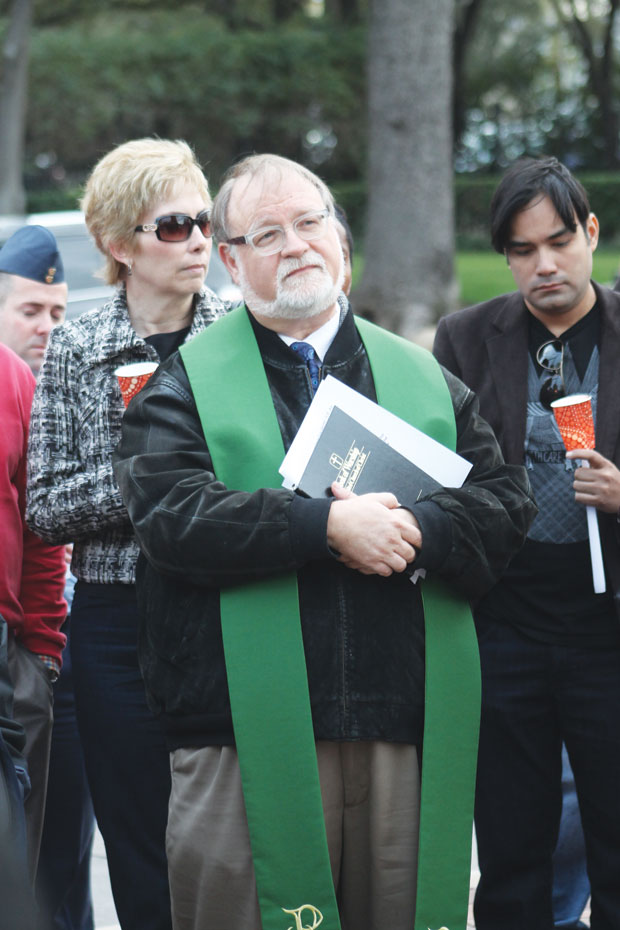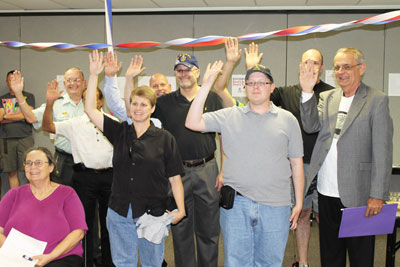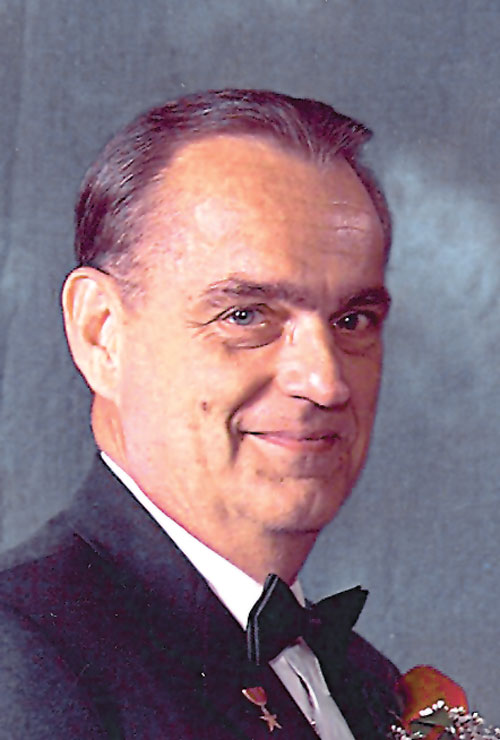Gay 23-year Air Force vet became North Texas’ pre-eminent advocate for the repeal of ‘don’t ask, don’t tell’

PAYING RESPECTS | The Rev. Stephen Sprinkle, center, who delivered the eulogy at the funeral of Dave Guy-Gainer on Feb. 7, also spoke at the impromptu candlelight memorial at the Legacy of Love monument on Cedar Springs Road on Feb. 4. (David Taffet/Dallas Voice)
DAVID TAFFET | Staff Writer
taffet@dallasvoice.com
American flags lined the walk in front of Cathedral of Hope for the funeral of Dave Guy-Gainer on Tuesday, Feb. 7.
The 63-year-old gay Air Force veteran who served for 23 years and spent a decade working tirelessly for the repeal of “don’t ask, don’t tell” died unexpectedly Feb. 2.
At a hastily called memorial at the Legacy of Love monument on Cedar Springs Road on Saturday, Feb. 4, Dallas Gay and Lesbian Alliance President Patti Fink said, “I don’t know why Dave died, but I do know why he lived.”
Rafael McDonnell, communications and advocacy manager for Resource Center Dallas, said the day Guy-Gainer died was the saddest of his life.
And Stonewall Democrats of Dallas President Omar Narvaez recalled that on the day DADT repeal took effect last year, Guy-Gainer told him, “The fight’s not over.”
Among the continuing fights Guy-Gainer envisioned was acceptance by and service from the military’s Chaplain Corps. Toward that end, Guy-Gainer helped create the Forum on the Military Chaplaincy. In October, he brought a group together from around the country for a meeting at the Interfaith Peace Chapel in Dallas to formalize plans for the forum.
And while gays, lesbians and bisexuals can now serve openly, Guy-Gainer continued to fight for the rights of transgender men and women to serve.
“It’s very sad for us,” said Dennis Coleman, executive director of Equality Texas, where Guy-Gainer was a board member. “He was dedicated to state work as well as federal work.”
Guy-Gainer worked locally as well. In 2010, he ran as an openly gay candidate for City Council in Forest Hill, a small town south of Fort Worth in Tarrant County. Although he made it to the runoff, he lost to the 12-year incumbent by a few dozen votes.
In remarks at the funeral, gay retired Army Col. Paul Dodd said Guy-Gainer, who became the pre-eminent advocate for DADT repeal in North Texas, worked just as hard to end the problem of bullying. He alluded to Guy-Gainer’s death-by-suicide indirectly.
Dodd said that on Sept. 20, 2011, the day DADT repeal went into effect, Guy-Gainer wrote, “After a celebratory, euphoric high, this old airman crash landed tonight with reports of another youth who took his own life. We simply aren’t getting to the youth who are suffering.”
The Rev. Stephen Sprinkle, who was a close friend of Guy-Gainer’s and delivered the eulogy, talked about the suicide more directly. He said he felt anguished over how to deal with it in the funeral service.
“Everyone was hurting from it,” Sprinkle said. “Frustration, anger, guilt — that’s what I had to address.”

CELEBRATING REPEAL | Gay and lesbian veterans, including Dave Guy-Gainer, far right, identified themselves at a celebration at the Resource Center Dallas on Sept. 20, 2011, the day the repeal of “don’t ask, don’t tell” went into effect. (David Taffet/Dallas Voice)
He said he decided to talk about Guy-Gainer’s suicide so that those mourning his loss wouldn’t treat it as a scandal but as a tragedy. And he said he needed to dismiss fundamentalist beliefs of eternal damnation for those who take their own lives.
“One of our tall trees fell, and we all feel it,” Sprinkle began his eulogy. “I begin with sighs too deep for words.”
He spoke about the biblical concept of lamentation.
“Lamentation is something the community needs to know how to do,” he said. “Suicide is a single act with plural effects that arose from problems and pain.”
But he said he’d simply miss Guy-Gainer’s “sweet, awkward goofiness” and praised him as a “relentless advocate for human rights” who fought “bullying and anti-LGBTQ religious bigotry.”
Guy-Gainer joined the Air Force at the age of 18 and served for 23 years. His work for the repeal of DADT and his LGBT activism began after another gay vet insisted he march in uniform in Austin’s Pride parade in 2001.
He became vice president of American Veterans for Equal Rights and served on the board of Servicemembers Legal Defense Network for about five years.
Gainer grew up in Charleston, W. Va., in what he called a “very, very fundamentalist family.”
In a 2009 profile published by Dallas Voice, he said growing up he knew he was gay, but that he was raised to be a minister.
“I figured, I’ll join the military, that’ll fix me,” he said. “I’ll get married like all the GIs did, and that’ll fix me. But you know what? It didn’t fix me.”
Guy-Gainer’s daughter, Brie, said that wasn’t his only reason to join the military.
“Dad has a true passion for the rights and duties of people who choose to live in a free country,” she wrote to Dallas Voice in 2009.
Guy-Gainer received five Meritorious Service medals and the Bronze Star and retired in 1990 as a chief master sergeant, a rank achieved by the top 1 percent of enlisted men and women.
He met his husband David Guy in 2000. They married in San Francisco in 2004 and had a commitment ceremony in Texas followed by a party at the military base in San Antonio where he worked at the time.
His work to end DADT earned him an invitation to the White House signing ceremony for the repeal legislation in December 2010. In September 2011, at a party celebrating the repeal going into effect, he donated boxes of papers relating to his work to the Phil Johnson Historic Archives and Research Library at Resource Center.
After the funeral service at Cathedral of Hope, Guy-Gainer was buried at the DFW National Cemetery in Dallas with full military honors.
Guy asked that donations be made to Forum on the Military Chaplaincy, in care of Cathedral of Hope, 5910 Cedar Springs, Dallas, Texas 75235.
This article appeared in the Dallas Voice print edition February 10, 2012.















I served with David on the SLDN Board for many years. He will be sorely missed. It may sound trite to read that simple statement, but believe me, for David it isn’t nearly enough. I just can’t be as articulate as he deserves, and for that I’m deeply regretful. He was truly one of a kind.
My condolences to Guy-Gainer’s friends and colleagues. This is indeed a loss to our community.
I don’t mean any disrespect, I would just like to know what editorial policy is in reporting cause of death in the Voice. Is “died unexpectedly” a cultural euphemism I wasn’t aware of?
If it is not under investigation, editorial would be better if we addressed cause of death directly in the first or second line and not bury it 10 paragraphs deep. There is a way to respectfully address cause of death so that readers know what they are reading.
This is a sad day for our community. While we keep telling people it gets better, this continues. I never met this gentleman, but we communicated through various other avenues, and I had great respect for him. Religion, hatred, prejudice, continues to kill us. May his legacy of helping to repeal DADT and improve the lives of our GLB and hopefully soon T military personell be remembered.
To Skye, and any others who are wondering, one of my father’s favorite words was “Nunya.” Really, does the specific cause of my father’s death need to be addressed? And why? His suicide will not be the highlight of the way in which my father lived his life or the battles he fought. On behalf of the Gainer family, I thank the Dallas Voice for its discretion.
Skye, that is really disrespectful. If the family wanted his death sensationalized, I’m sure they would have allowed it to be.
As long as this publication chooses to print unmanaged reader comments any discretion intended by the writer can be diminsihed by one comment under the article.
Skye: I think I was clear in the article what the cause of death was. I don’t think it needed to be in the first sentence. Unexpected was not a euphemism. It was a fact that those around him saw little evidence of depression or signs of imminent suicide, so it was unexpected.
Brie, my love to you and your family. Your dad was on my radio show many times and was always a great resource for information and contacts. We always try to present a story of a death appropriately, but in your Dad’s case it was even tougher because he was also a friend. May his memory will be a blessing.
David was my brother-in-law. Brie couldn’t have said it better with “His suicide will not be the highlight of the way in which my father lived his life or the battles he fought.” He was an extraordinary man, who fought tirelessly to ensure the rights of the LGBT community. However, that was only part of who he was as a person. He had a tremendous amount of love in his heart, was extremely intelligent, compassionate, hilarious, and even a little nerdy, in an awkwardly adorable way. The love he and my brother had shared was genuine, and very few people could ever achieve it. His death was definitely unexpected and sudden. No matter how he died, his life and his works should be celebrated.
I am Dave’s Niece – his brother being my father – unfortunately now my father and I have a shared experience of losing a brother in such a tragic way. NO FAMILY should know this loss but too many do and while my words are not nearly as nice nor concisely worded as my cuz’s (Brie) it really is absolutely NUNYA’s business exactly how anyone dies. The only real news is that a great man who I was not as honored to know as well as many of you did is no longer on this plane with us. How he left is truly irrelevant!
Heroe
– That is the word that comes to mind when I think of David Guy Gainer. I just saw Dave in Austin this Pride and we were talking about how the next generation of active duty military can now speak out. What an awesome life accomplishment to be apart of showing people what a true American Hero looks like and does!
As a Texan David always had a classic story, our personal story that we created was when David and David came to Rochester, NY in February in a blizzard to help us form a branch of American Veterans for Equal Rights. It was the Valentines Red Ball in Rochester where David in his sharp uniform and David in his sharp civies represented the Military and Texas. David lived his life well! I will truely miss him and hope to be just a bit of a man that he was!
I had the honor and the privelge of knowing and working with Dave Guy-Gainer since 2001 at
Austin’s first pride parade. It was Dave who got me started with the American Veterans for Equal Rights (AVER). We marched in numerous Pride Parades all over Texas since then! If only we all could be so giving of ourselves and encourage others to give, whatever the amount or the time. No matter what he will always be “my big blue brother” in the sky.
I had the privilege of knowing Dave over 20 years ago, while dating his daughter and my “worldview” was expanded due to my friendship with him. I have never known a more intelligent and thoughtful man. He was someone that I looked up to in regards to his education, work ethic and moral beliefs. He truly worked very hard to make the world a better place for all of us. I am saddened to just find out about his passing. Being raised in a military family myself, I know that both my parents also respected him greatly and his service to our country.